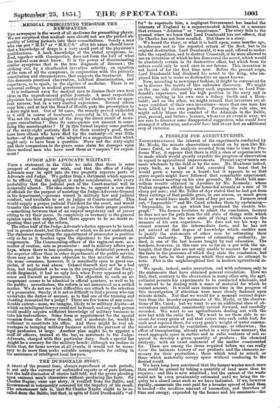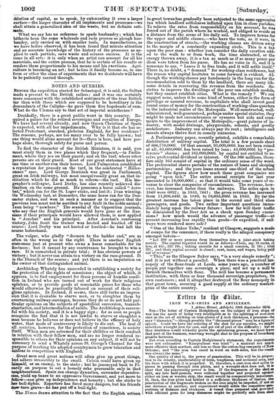A PROBLEM FOR AGItICULTITRISTS. NOTWITHSTANDING the interest of the experiments
conducted by Mr. Mechi, the minute observations carried on by men like Mr. James Caird, or the analysis recorded from time to time by Pro- fessor Way, it appears that there is still a class of experiments to he made which would. greatly expedite the progress of observation in regard to agricultural improvements. Present exrertmenta are made wholesale by the field or by the acre. Mr. limas-we indeed, years back, as a kind of feat, executed the boast that he would grow a turnip on a board ; but it appears to us that grave sequels might have followed that remarkable experiment. At the recent meeting on his own grounds, Mr. Meehi told mar- vellous results obtained in Ayrshire by Mr. Kennedy ; whose Italian ryegrass affords keep for home-fed animals at a rate of 70 sheep per acre ; and Mr. Telfer of Ayr stated that he had got from three cuttings of that prolific grass, in one season, as much green food as would have made 20 tons of hay per acre. Farmers cried out, " Impossible !" and Mr. Caird rebukes them by exclaiming- " Impossible, in an age which has produced the electric tele- graph!" The farmer hesitates to admit the conclusion because he does not see the path from the old state of things with which he is acquainted to the new state of things which exceeds the measure of his own experience. He does not see his way : he cannot account for the intermediate facts, and. he has not yet arrived at that degree of knowledge which enables men to justify the statements of other men by estimating their probable authority. The power of estimating authority, in- deed, is one of the last lessons taught by real education. The teachers, however' in this case are so far on a par with the un- taught, that they also are not only unable to account for many of the facts in the processes of which they state the conclusion, but there are facts in that process which they make no attempt to note. This is the unphilosophical fact in modern agricultural in- quiry. We speak, indeed, under correction, and with reference only to the statements that have obtained general circulation. Here we find, that, contrary to the observation in many other arts, the agri- culturist permits his experiments to be conducted. wholesale, and is content to be dealing with a mass of material for which he cannot account. It would save immense time in the progress of this investigation if attention were more closely fastened upon minute details. Not that we would for a moment counsel depar- ture from the broader experiments of Mr. Meal, or the observa- tions of Mr. Caird; but we want to see an additional class of ob- servations instituted, consistently carried forward, and carefully recorded. We want to see agriculturists dealing not with the acre but with the cubic foot. We want to see them able to ac- count for every grain of soil that enters into each cubic foot, for each seed reposed there, for every grain's weight of water commu- nicated or abstracted by ventilation, drainage, or otherwise; the effect of transplanting, already noted in a very loose manner; the exact aggregate space in surface and in cubic contents of soil re- quired to develop a given quantity of produce ; the chemical analysis; with an exact statement of the matter unaccounted for. These are among the items required before we can really know the intimate history of our products and the elements ne- cessary for their production ; those which tend to retard, or those which materially occupy space without conducing to the desired result.
We have long been convinced that the farmer wastes much more than could be gained by taking a quantity of land more than he requires : and this is now admitted ; but the extent of the waste could not be even proximately estimated until we bring the in- quiry to a closed issue such as we have indicated. If we however .rapidlyreaumerate the rent paid for a broader spread of land than is needed—the needless amount of locomotion' and therefore of time and energy, expended by the farmer and his assistants—the
dilution of capital, so to speak, by extenuating it over a larger surfaoe—the larger chmaoter of all implements and processes—we shall attain a generalized idea-of -tha waste, -but no definite esti- mate.
What we say has no reference to spade husbandry; which has hitherto been the same wholesale and rude process as plough hus- bandry, only carried on with smaller tools. In manufactures, as we have before observed, it has been found that minute attention and an accurate knowledge of the history of the processes as ap- plied to each particle, save waste and secures success. It is the same in all arts : it is only when an artist can account for all his materials, and the entire process, that he is certain of his results or renders them proportionate to his means and his exertions. Agri- culture is becoming an art; but before it finally become so, in one form or other the class of experiments that we desiderate will have to be patiently carried through.



























 Previous page
Previous page